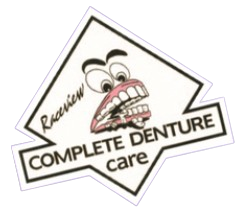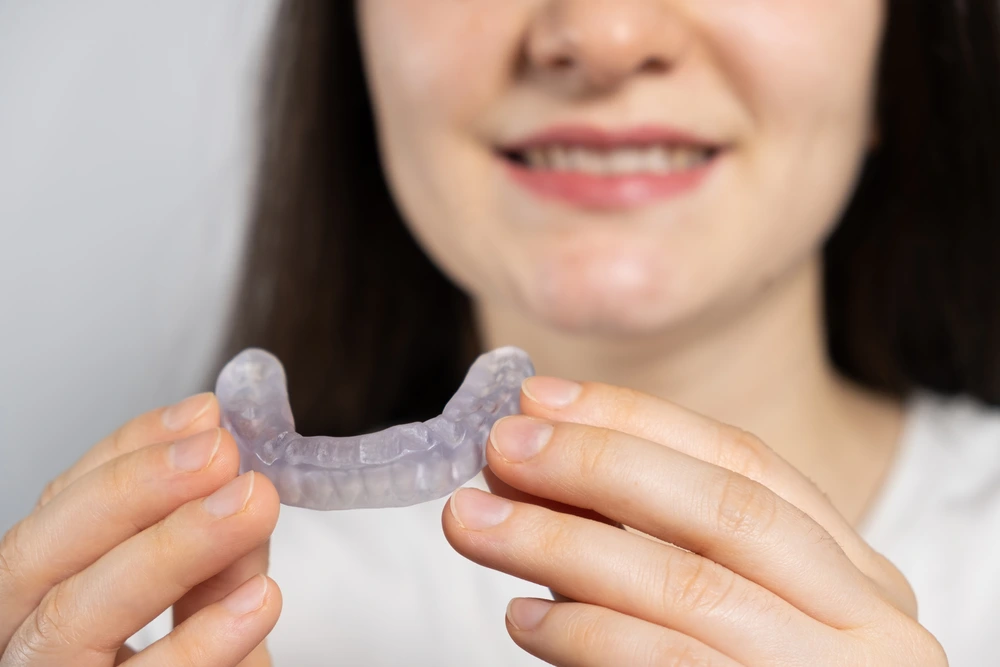A mouth guard for jaw clenching is one of the most effective tools to protect your teeth and jaw joints from the excessive pressure of nighttime grinding. Jaw clenching, also known as bruxism, often goes unnoticed until symptoms like tooth sensitivity, enamel wear, or persistent jaw discomfort begin to appear. Over time, this constant grinding can lead to chipped teeth, damaged dental work, and strain on the temporomandibular joint (TMJ), resulting in ongoing pain and limited jaw movement.
For many people, especially those dealing with stress or disrupted sleep patterns, teeth grinding at night becomes a persistent habit. A custom dental mouth guard provides reliable teeth grinding relief by creating a protective barrier between the upper and lower teeth, absorbing the forces of clenching. This not only helps prevent dental damage but also promotes jaw pain relief by allowing the jaw muscles and joints to relax during sleep, reducing morning stiffness and discomfort.
If you are considering a mouth guard for jaw clenching in Ipswich, it’s important to consult with a dental professional who can assess your needs and recommend the most suitable option. A properly fitted mouth guard is a simple yet essential step towards protecting your teeth, improving sleep quality, and maintaining long-term oral health.
Understanding Jaw Clenching (Bruxism)
Bruxism (teeth grinding) is an involuntary habit of clenching or grinding the teeth. It often happens during sleep, and many people don’t realise they’re doing it. Stress, anxiety, or sleep disorders can trigger clenching. Bruxism is often caused by stress and anxiety and commonly occurs at night while sleeping. Symptoms of bruxism can include morning headaches, jaw muscle pain, earaches, and dental damage. Long-term grinding can lead to cracked, chipped, or worn teeth and even loose teeth. It can also strain the temporomandibular joint (TMJ) on each side of your face, causing pain, clicking, or limited jaw movement. Left untreated, these issues not only hurt but may also require costly dental work.
Why Jaw Clenching Harms Teeth and Joints
When you clench, the force of your bite can be several times stronger than normal chewing. This abnormal pressure wears away enamel and can break fillings or crowns. Over time, you might notice that your teeth look flatter or have chips. Clenching also tenses the jaw muscles and forces the TMJ into a stressed position. Better Health Channel warns that chronic grinding may include cracked, broken, or worn teeth and lists “strain on the jaw joint (temporomandibular joint)” and jaw pain as common problems. This can manifest as a stiff, sore jaw in the morning or difficulty fully opening your mouth. If ignored, TMJ stress can lead to chronic jaw pain and even headaches.
How a Mouth Guard Protects Teeth and Joints
A mouth guard (often called a night guard or occlusal splint) sits between your upper and lower teeth. Think of it as a shock absorber: when you grind, the guard takes the hit instead of your enamel. In practical terms, it prevents the teeth from directly contacting and wearing each other down. Healthdirect Australia explains that you can also get a mouthguard or splint to help protect your teeth from grinding. A specially fitted mouthguard, or “bite splint,” is worn so that the guard is worn down instead of your teeth. In short, the mouth guard sacrifices itself (at a much lower cost) to save your natural teeth from damage.
But the benefits go beyond teeth. A night guard can reposition the jaw slightly, which helps the jaw muscles relax and reduce tension. By keeping your jaw in a more neutral position and preventing full clenching, the guard reduces strain on the TMJ and muscles. Many users find that this provides immediate relief from jaw pain; morning soreness often decreases once they consistently wear a night guard. In essence, the guard acts like a cushion and a stabiliser, protecting your teeth and giving your jaw joints a break.
Benefits of a Mouth Guard for Bruxism:
Shields enamel from wear and cracks: The guard takes the grinding, preventing chips or cracks.
Prevents dental damage: It can save costly repairs by stopping broken fillings and tooth fractures.
Reduces jaw-joint strain: Cushioning the bite relieves pressure on the TMJ.
Improves comfort and sleep: With less jaw clenching, many people sleep more soundly and wake with fewer headaches.
Types of Mouth Guards: Choosing the Right One
Not all guards are the same. You can pick up a simple over-the-counter guard or get a dentist-made custom appliance. Here’s a quick comparison:
| Mouth Guard Type | Fit & Comfort | Protection Level | Notes |
| Stock (pre-formed) | One-size, minimal fit | Low | Basic and bulky; not ideal for heavy grinders. Usually only moderate relief. |
| Boil-and-Bite | Heated & moulded at home | Medium | Available at pharmacies. Warmer, then bite to shape. Offers a better fit than stock. Good for mild grinding. |
| Custom Dental Guard | Perfect fit (by dentist) | High | Made from impressions of your teeth. Provides the best comfort and protection. Ideal for frequent clenchers and TMJ issues. |
Custom guards are generally worth the investment if clenching is severe. They fit snugly and last longer. In contrast, store-bought guards are cheaper but may feel bulky and wear out faster.
Using a Mouth Guard: What to Expect
When you first get a mouth guard, it might feel strange in your mouth. That’s normal. Start by wearing it for short periods during the day to get used to the sensation. After a few nights, most people adjust and find it comfortable. Wear it nightly as prescribed (usually just while sleeping, unless advised otherwise).
Care Tips: Rinse your guard after each use and brush it gently with toothpaste. Store it in its case so it stays clean. Over time, the guard can wear off, so have your dentist check it during routine visits. A well-maintained guard can last a year or more, depending on how vigorously you grind.
Additional Relief Strategies
While mouth guards are a top solution, combining them with lifestyle tweaks gives the best relief. Consider these teeth-grinding relief tips:
Stress reduction: Since anxiety often triggers clenching, practice relaxation or mindfulness before bed.
Sleep hygiene: Keep a regular sleep schedule and create a calming bedtime routine.
Limit stimulants: Avoid caffeine, alcohol, or heavy meals close to bedtime, as these can worsen grinding.
Jaw exercises: Gentle jaw stretches and massages can relax overworked muscles.
Good posture: Holding tension in your neck/shoulders can affect jaw position. Maintain good posture during the day.
Professional therapy: In some cases, counseling or cognitive behavioral therapy can help if grinding is linked to stress or sleep disorders.
Each step adds to jaw pain relief and helps stop teeth grinding at night. If you snore or have sleep apnea, getting that treated can also reduce bruxism.
Seeking Professional Help
If self-care doesn’t solve the problem, see a dentist or doctor. They will examine your teeth and bite and may recommend treatment. A dentist can measure wear on your teeth or jaw joints. In many cases, they will prescribe a custom night guard tailored to you.
You should also discuss pain; persistent jaw or facial pain deserves attention. A dentist or medical professional can check if the cause is bruxism or a related issue like TMJ disorder, and refer you to specialists if needed. Early intervention is key.
Effective Relief for Teeth Grinding and Jaw Pain
Protecting your teeth and jaw from the harmful effects of clenching and grinding is essential for maintaining long-term oral health and overall comfort. A mouth guard for jaw clenching serves as a protective barrier, preventing enamel wear, tooth fractures, and relieving pressure on the temporomandibular joints (TMJ). Whether you’re dealing with mild teeth grinding or more severe jaw discomfort, investing in a properly fitted mouth guard can provide lasting relief and prevent more serious dental problems down the track.
Opting for a custom dental mouth guard ensures a perfect fit, superior comfort, and the highest level of protection. Combined with simple lifestyle changes like stress management and sleep improvements, a night guard is one of the most effective tools for achieving consistent teeth grinding relief and jaw pain relief.
If you’re in Ipswich and seeking a reliable solution for jaw clenching, Raceview Complete Denture Care offers professional mouth guard fittings, custom dentures, partial dentures, denture repairs, and relines. Our experienced team is dedicated to providing personalised care to protect your teeth, improve comfort, and restore your confident smile. Book a free consultation today and get expert advice tailored to your needs.
FAQs:
Can a mouth guard help with jaw clenching and teeth grinding?
Yes, a mouth guard acts as a protective barrier between your teeth, absorbing the grinding forces and preventing enamel damage. It also helps reduce tension on the jaw joints (TMJ), offering relief from jaw pain and discomfort caused by clenching.
How do I know if I need a night guard for teeth grinding?
Common signs include morning jaw pain, headaches, tooth sensitivity, and visible wear on teeth. If you experience these symptoms, it’s best to consult a dental professional for an assessment and fitting.
How long does a custom dental mouth guard last?
A custom dental mouth guard typically lasts between 1 to 3 years, depending on the severity of grinding and how well it’s maintained. Regular dental check-ups are recommended to ensure it remains effective and in good condition.



